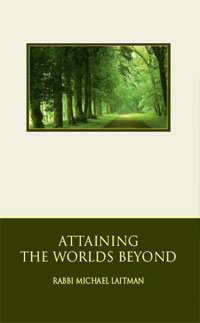 The Importance of Self-Evaluation in Spiritual Work
The Importance of Self-Evaluation in Spiritual Work
According to Kabbalah, our bodies are only a temporary casing for an eternal soul that descends from Above, and that the cycle of life and death can be compared to the change of clothing by a person in our world. The soul changes one body for another just as easily as a person changes one set of clothes for another.
The definition of the Creator’s selfless fulfillment of His Will, as well as the definition of being an altruist in both thought and action, embodies the process of self-evaluation and self-assessment, regardless of unpleasant events, feelings, or incidents that are purposely sent by the Creator to the person.
The process of self-evaluation should bring one to see how low one’s state truly is, yet keep that person committed to the fulfillment of the Creator’s Will, and to the aspiration of carrying out the direct and just laws of the spiritual world, contrary to one’s “personal” well-being.
Building a Deficiency for the Creator’s Greatness
The desire to be similar to the Creator in one’s qualities may derive from the suffering and trials one experiences, but it can also emanate from the perception of the Creator’s grandeur. Then, an individual’s choice involves asking the Creator for advancement by means of Kabbalah.
All the actions we undertake must be motivated by our intention to perceive the grandeur of the Creator, so that the perception and the realization of this aspect could help us become purer and more spiritual.
In order to advance spiritually, we must, at every level, be concerned with the development within us of our perception of the Creator’s grandeur. We must realize that to attain spiritual perfection or even to remain at the spiritual level at which we exist, we need to cultivate a deeper understanding of the Creator’s grandeur.
Faith in the Creator and Kabbalah’s Value
The worth of the gift is determined by the importance of the one who gives it. This is true to a great degree. For instance, an object that belongs to someone considered famous and important by society is often worth millions.
The worth of Kabbalah is also determined by the prominence of the One Who awards us Kabbalah. If one does not believe in the Creator, then Kabbalah is worth no more to that person than any other historical or literary document. But if one does believe in the power of Kabbalah and in its usefulness because one believes in the Upper Power, then the value of Kabbalah is immeasurably higher.
The more we believe in the Creator, the more value Kabbalah presents for us.
Consequently, every time we voluntarily submit to the Dominion of the Creator in accordance with the magnitude of our faith in Him, we also grasp the significance of Kabbalah and its inner meaning. In this manner, it can be said that each consecutive time we reach a higher spiritual level, we receive a new Kabbalah (Light), as if from a new Creator.
The War Against Our Egoistic Desires
The above process refers only to those who receive a new Revelation of the Creator’s Light as they ascend on the spiritual ladder. For this reason, it is said that “The righteous person lives by his faith”—the magnitude of one’s faith determines the amount of the perceived Light.
It is written in the books of Kabbalah, “Every day is he awarding of the new Light.” For a Kabbalist, every “day” (the time when the Light of the Creator radiates) is a new Light.
We may be brought up to observe the commandments, but it is impossible to educate us with the need to assign our actions particular altruistic intentions, since this cannot become part of our egoistic nature that could automatically be carried out just like our physical needs.
If we are permeated by the feeling that our war against egoism is a war against the forces of darkness, against the qualities that are opposite to those of the Creator, then in this manner we remove these forces from ourselves, and do not associate oneself with them; avoid them in our thoughts, as if departing from the desires of our own bodies.
Continuing to feel these desires, we begin to despise them, as one despises an enemy. In this manner, we can triumph over egoism, and at the same time find comfort from its suffering. An action of this type is known as “the war of vengeance for the sake of the Creator” (nikmat hashem). Gradually, we can get used to perceiving the right goals, thoughts, and intentions, regardless of the desires and egoistic demands of the body.
 “Who Else Wants to Be Like the Creator?” is based on the book, Attaining the Worlds Beyond by Dr. Michael Laitman.
“Who Else Wants to Be Like the Creator?” is based on the book, Attaining the Worlds Beyond by Dr. Michael Laitman.
